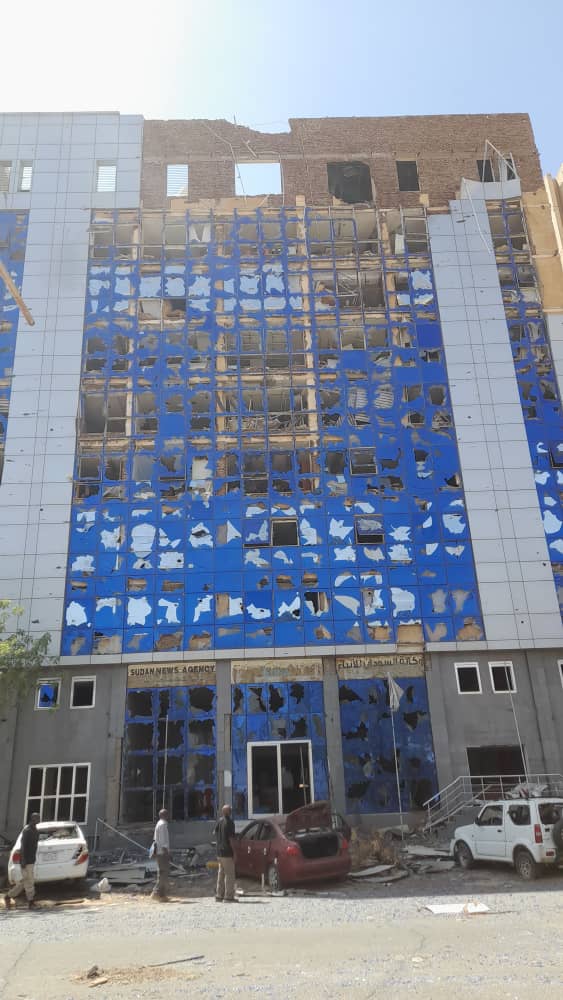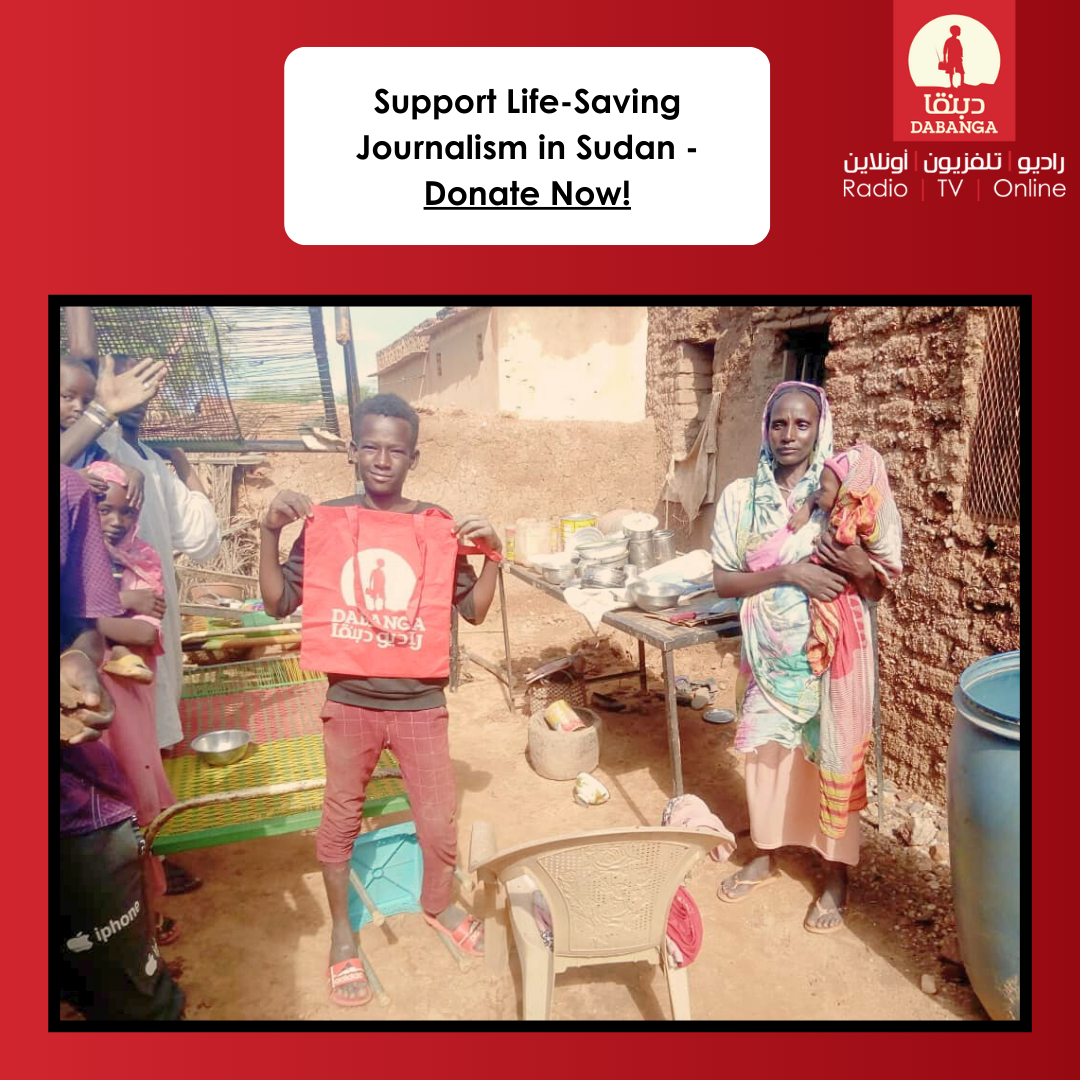Sudan war leaves 90% of media infrastructure in ruins

War damage to the headquarters of the Sudan News Agency (SUNA) in Khartoum (Photo: SUNA)
As the Sudanese Armed Forces have slowly regained control over much of Khartoum over the past days, reports are confirming that at least 90 per cent of media, including TV, radio, and neswpaper facilities have been completely destroyed during the hostilities, while looters have stripped any usable equipment and assets in the city that has always been Sudan’s main media hub.
In a report, the Sudanese Journalists Syndicate laments that the offices headquarters of more than 29 media institutions and press offices were subjected to invasion, complete destruction, and closure. In Khartoum state, 10 radio stations have ceased operations, while Sudanese Radio resumed broadcasting from Port Sudan. The fighting disrupted six TV stations in Khartoum state, while at least eight radio stations were suspended across the other states of Sudan.
No print newspapers
According to the syndicate, the war has led to the complete cessation of print newspapers for the first time in more than 120 years, leaving about 90 per cent of workers in the sector without work. They point out that Omdurman National Radio fell silent for a time, before it resumed broadcasting recently “which has not happened since its establishment in 1940.”
Newspaper offices Khartoum and the states, radio stations, local public and private TV stations, press training centres, production and media services, are still completely suspended, either because they are located in the midst of fighting areas, which makes access difficult, or because of looting, smuggling or occupation.
The headquarters of the state-owned Sudan News Agency (SUNA) in central Khartoum has been devastated by the hostilities, according to pictures emerging from the city. The building itself has suffered structural damage, while all offices and equipment were either destroyed or cleared by looters. According to SUNA, the walls of the building were severely damaged by gunfire and shelling. The agency’s vehicles were burnt.
Radio is a lifeline
A report by Radio Dabanga published on the occasion of World Radio Day on February 13, highlights that radio remains a vital source of information worldwide, but in war torn Sudan, it is a lifeline. The role of independent broadcasters has never been more critical, especially in Sudan, as the war between the between the Sudanese Armed Forces and the paramilitary Rapid Support Forces (RSF) now approaches its 22nd month.
For millions of Sudanese caught in the country’s ongoing conflict, Radio Dabanga is more than just a news outlet, it is a crucial source of verified, independent information.
Since its launch in 2008, the station has provided vital updates on displacement, human rights abuses, and humanitarian crises, cutting through censorship to amplify voices on the ground.
Despite expanding into satellite television, social media, and a bilingual website, radio remains at the core of its mission to deliver the truth.
In comments to mark Human Rights Day 2024, Kamal El Sadig, Editor-in-Chief of Radio Dabanga, highlighted the vital role of the station’s shortwave broadcasts, which are a lifeline for those in remote Sudan, refugees, and displaced people.
He said, “Threats, attacks, and abuses against journalists have escalated, making it extremely challenging for Dabanga’s correspondents, and most other media, to obtain and verify information that can sometimes mean the difference between life and death to our listeners in the war zone.
The war in Sudan has devastated the country’s media, destroying 90 per cent of its infrastructure and displacing around a thousand journalists, according to the Sudanese Journalists Syndicate (SJS).
Many media outlets were looted, forcing journalists to flee or seek other work. At the SJS conference in Cairo in October last year, Eman Fadul, Secretary of Freedoms at the SJS, highlighted that 80 per cent of Sudan’s states were cut off from internet access, making it difficult to report on the conflict.
In the past 18 months, 445 journalists in Sudan have been killed, arrested, or tortured, with 20 facing charges for alleged links to the RSF.
Women journalists have been particularly vulnerable, with 11 assaulted and 54 disappeared or arrested, while many have faced gender-based violence or exploitation.
Displaced journalists also struggle with professional and legal challenges, including forced exile.
On World Radio Day, press freedom advocates are calling for greater support for independent journalism in Sudan.
Radio Dabanga, operating from exile, continues to broadcast against the odds. Its supporters say it plays an essential role in ensuring that Sudanese communities, especially those cut off by war, have access to reliable information.

For Independent Sudanese News: Support Dabanga Today!
Radio Dabanga has delivered accurate, independent, and verified Sudanese news since 2008. Since then, we’ve launched a satellite TV channel, expanded onto social media platforms, and created a website in both Arabic and English.
We are the information lifeline to millions of ordinary people within war-torn Sudan, giving them a platform to be heard and amplifying their voices to the world!
But we can’t do it without YOU. We need your support to stay on air and keep delivering the news that truly matters. Your donation helps us keep this vital work alive—donate now to keep Dabanga broadcasting strong!
To support Radio Dabanga, visit our donation link: Keep Dabanga On Air!











 and then
and then